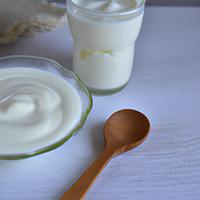
1 serving (150 grams) contains 100 calories, 5.5 grams of protein, 3.5 grams of fat, and 7.0 grams of carbohydrates.

Log this food in SnapCalorie

Nutrition Information
Calories |
157.7 | ||
|---|---|---|---|
% Daily Value* |
|||
| Total Fat | 5.5 g | 7% | |
| Saturated Fat | 3.6 g | 18% | |
| Polyunsaturated Fat | 0 g | ||
| Cholesterol | 15.8 mg | 5% | |
| Sodium | 78.9 mg | 3% | |
| Total Carbohydrates | 11.0 g | 4% | |
| Dietary Fiber | 0 g | 0% | |
| Sugars | 11.0 g | ||
| protein | 8.7 g | 17% | |
| Vitamin D | 0 mcg | 0% | |
| Calcium | 236.6 mg | 18% | |
| Iron | 0.2 mg | 1% | |
| Potassium | 315.5 mg | 6% | |
* Percent Daily Values are based on a 2,000 calorie diet. Your daily values may be higher or lower depending on your calorie needs.
Food Attributes
Source of Calories
About Natural yoghurt without sugar
Natural yoghurt without sugar is a creamy dairy product made by fermenting milk with live bacteria cultures, such as Lactobacillus and Streptococcus. Originating from ancient practices in regions like the Middle East, India, and the Mediterranean, it’s a versatile staple in various cuisines, from savory dips like tzatziki to smoothie bases. This yoghurt is prized for its health benefits, as it's rich in protein, calcium, and probiotics that support digestive health and strengthen the immune system. With no added sugars, it’s low in carbohydrates, making it suitable for individuals watching their sugar intake or following a low-carb diet. However, its tangy flavor may not appeal to everyone, and those needing additional sweetness can opt for natural toppings like fruit or honey. While it’s generally healthy, moderation is key due to its natural fat content, especially in full-fat varieties.



